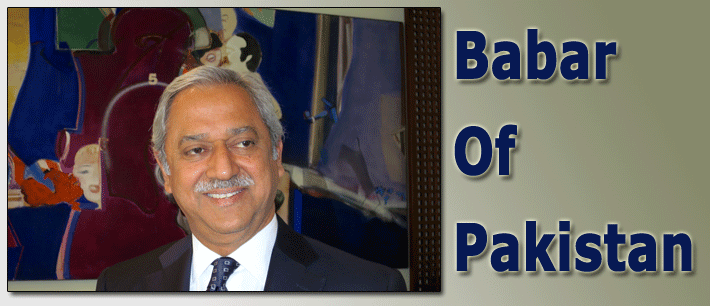
After
talking with Babar Badat, Managing Director of Transfreight
Corporation (Pvt) Ltd of Karachi, Pakistan, it’s
easy to understand why the International Federation
of Freight Forwarders Associations (FIATA) reconfirmed
this effusive and approachable executive to the
post of senior vice president last year at its Annual
World Congress 2015 in Chinese Taipei.
FIATA, with national
representation from 160 countries and more than
40,000 international logistics companies as members,
had many places to turn and several excellent choices
to round out its board, but moved toward Mr. Badat.
He has emerged as a leader and pioneering organizer
of a robust and effective logistics industry that
has become a bright spot on the Pakistani landscape.
Mr. Badat is a founder
and served as first Chairman of the Pakistan International
Freight Forwarders Association (PIFFA), which has
grown from just a few companies in 2005 to more
than 500 today.
The role of PIFFA
includes support for Pakistan trade worldwide and
the development and maintenance of a healthy international
freight industry within Pakistan.
PIFFA also works to
ensure that a level playing field exists for companies
involved in attempting to establish and maintain
the movement of freight both in the country and
worldwide by all modes transport.
PIFFA promotes the
freight/logistics service industry as a whole.
“The Association
aims to achieve standardization in the industry
and to promote a high degree of professional conduct
among its members, including ethics and financial
viability.
“PIFFA has also
been instrumental in establishing and continuously
updating the industry's S.T.C (Standard Trading
Conditions).
Meetings
All The Time
PIFFA is quite active,
with several monthly meetings that include a vigorous,
well-informed engaged membership.
“PIFFA sees
Pakistan’s historic and geographic position
and well-educated population as building blocks
to trade development and business expansion for
the country,” Mr. Badat said.
“PIFFA speaks
to better and fairer trade relations and business
practices at home, in Europe, and elsewhere.
“PIFFA also
works as a focus organization with youth outreach
programs for training forwarders, and is rated excellent
by any standard.
“PIFFA is building
a vibrant, active logistics community in Pakistan
that has grown and prospered during the last decade.
PIFFA has grown trade, moving cargoes into and out
of the country, Afghanistan, and elsewhere in the
region,” Babar said.
Present
At The Creation
Mr. Badat’s company,
Transfreight, was founded in December 1982, an outgrowth
of a JV with a German company that began in 1979.
It is one of Pakistan's
earliest international freight forwarding organizations.
Transfreight maintains
its own shipping as well as custom licenses issued
by the Government of Pakistan and operates services
for a selected range of clients for their exports
as well as imports.
Among other things,
the company has been handling project cargoes for
the country’s textile trade.
It should be mentioned
that Transfreight is responsible for shipping most
of the major projects of textile, spinning, &
weaving machinery imported from Europe to Pakistan
since 1982.
“But we have
the capability to handle any size project, with
separate teams of dedicated professionals available
who can handle shipments from the country of origin
to delivery at final site,” Mr. Badat said
softly.
One
Step at a Time
Babar Badat may have
low friends in high places in Pakistan, but he uses
his unique position to drive the destiny of his
homeland into the modern logistics world. Despite
the many well-publicized challenges, he remains
convinced Pakistan’s day is coming.
“You must always
maintain your sense of purpose and mission to build
on the great potential of the country. Now approaching
200 million people, we rank as the sixth largest
nation on earth.
“It also does
not hurt to maintain your sense of humor,”
Mr. Badat smiles.
“Yes, there
are problems, both social and political, which stretch
across the canvas, affecting our ability to move
ahead, I think but the government is moving to right
things.
“Our country
contributes to charity; in fact, outside of America,
we’re one of the biggest contributors in the
world.
“Transfreight
is primarily a freight forwarding company with offices
throughout Pakistan.
“From our beginnings
we have kept pace and even slightly ahead of market.
“Over the years
we have set up independent companies (including
trucking) that served as conduits to move cargo—first
for Russia and later for NATO into Afghanistan and
elsewhere.
“Of course,
as a matter of how we do business, Transfreight
considers itself quite flexible and ready to use
our market position and expertise to create custom
programs to meet any specific demand.”
Looking
Ahead
In terms of the future,
Mr. Badat outlined a view that is now further developed
from where it was at last year’s FIATA World
Congress in Taipei. While some countries might not
take a second look at Pakistan, Mainland China has
developed opportunities for Pakistan with a $46
billion deal for road, rail, and pipelines along
what is euphemistically branded ‘The China
Pakistan Economic Corridor.’
“Karachi was
connected to the markets of Western China, but there
needs to be far more regional assimilation,”
Babar said at Taipei.
“For most countries
in the European Union and ASEAN, regional trade
consists of 45-55 percent of GDP, but because of
the lack of connectivity in our region, Pakistan
is at 4 or 5 percent of GDP,” he said.
“The potential
to connect in the region is huge and that is what
our government is doing and the logistics industry
is trying to play its role,” Mr. Badat said.
The China-Pakistan
Economic Corridor features a western route for transit
traffic from the port of Gwadar to Karachi. Inland,
the central route north from Karachi intersects
with the route that runs up from the middle of the
country.
As it develops, the
corridor will become “a game changer for the
region,” Babar Badat said.
Geoffrey
|





